What Are Your Favorite Writing-Related Books?
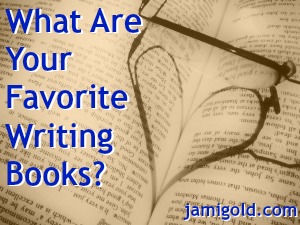
I spent a couple of hours yesterday playing with a plugin my Tech Guy installed on my site. (If you’re hosted with TechSurgeons as well, you might be able to get it on your site too if you ask Jay, our very own tech genius.)
The plugin is called MyBookTable and allows me to list books in different categories and offer buy links. Useful plugin for authors, right? *smile*
In my For Writers section, I created a page to list my favorite writing craft and reference books. I’ve added several books that I thought of off the top of my head, but I know I’m forgetting a bunch too.
When we start down the writing path, we have a lot to learn. We might have to learn story structure or the basics of grammar. Many an author has had to learn about point of view options or techniques for showing instead of telling.
And that’s just covering some of the basics of writing craft issues. We might also want to study query writing, how to self-edit, or how to self-publish—and there are books to cover all those topics and more.
So let me share the books I thought of yesterday (and more importantly, let me share why they were useful enough to be top of mind), and let’s see what others have to add as suggestions. *smile*
The Emotion Thesaurus: A Writer’s Guide to Character Expression
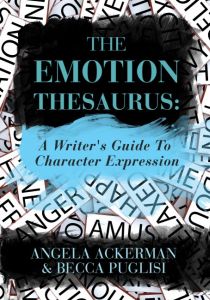 This book has been my #1 Go-To Writing Help book ever since it released. With 2 full pages of ideas about how to show character emotions for each of the 75 different entries, we can learn endless options for the physical signs, internal thoughts, and internal sensations (visceral reactions) for every emotion, whether the character is the point-of-view character or not.
This book has been my #1 Go-To Writing Help book ever since it released. With 2 full pages of ideas about how to show character emotions for each of the 75 different entries, we can learn endless options for the physical signs, internal thoughts, and internal sensations (visceral reactions) for every emotion, whether the character is the point-of-view character or not.
I could go on for pages and gush about the awesomeness of this book. *grin* Instead I’ll just point you to my post about how we can use this resource to improve our writing.
The Positive Trait Thesaurus: A Writer’s Guide to Character Attributes and The Negative Trait Thesaurus: A Writer’s Guide to Character Flaws
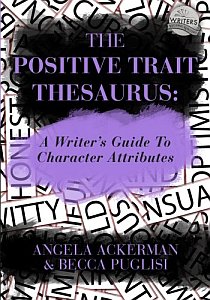
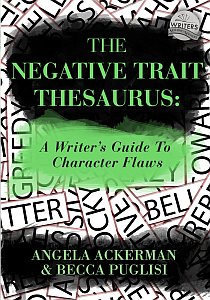 Finding the perfect mix of strengths and weaknesses for our characters can be difficult. We need to choose the right blend of strengths that make them admirable and worth rooting for—without making it too easy for them to succeed—and we need to figure out which flaws best fit our characters.
Finding the perfect mix of strengths and weaknesses for our characters can be difficult. We need to choose the right blend of strengths that make them admirable and worth rooting for—without making it too easy for them to succeed—and we need to figure out which flaws best fit our characters.
These books, cousins to the Emotion Thesaurus above, are great tools for creating three-dimensional characters. Check out the guest post by Becca (one of the co-authors) for more about how these books can be used in our writing.
Self-Editing for Fiction Writers, Second Edition: How to Edit Yourself into Print
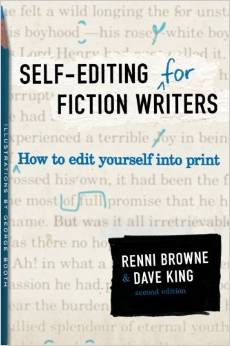 In this book, two editors step us through the process of editing our own work. They cover most of the major issues all writers—and newer writers especially—tend to struggle with in the pursuit of better writing.
In this book, two editors step us through the process of editing our own work. They cover most of the major issues all writers—and newer writers especially—tend to struggle with in the pursuit of better writing.
No matter how we plan to publish, we should strive for a cleaner manuscript. If we’re taking the traditional publishing path, quality writing craft makes it more likely an agent will request our pages. If we plan to self-publish, I wouldn’t recommend relying only on our own editing abilities and skipping an outside edit, but improving our prose the best we can on our own ensures that a freelance editor will be able to focus on the issues we can’t fix ourselves.
The Power Of Point Of View: Make Your Story Come To Life
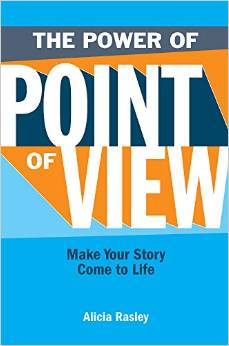 Many writers struggle to understand the differences between distant and close third person point of view, or when first person might work better than a close third (or vice versa). This book will make us a POV expert. Learn about the different styles of point of view, from omniscient third person to close first person—and everything in between.
Many writers struggle to understand the differences between distant and close third person point of view, or when first person might work better than a close third (or vice versa). This book will make us a POV expert. Learn about the different styles of point of view, from omniscient third person to close first person—and everything in between.
This book is perfect for those of us unsure about the differences between point-of-view styles or those who wonder which style is right for our story. Most of what I learned about POV started with this book.
Story Engineering: Master the 6 Core Competencies of Successful Writing
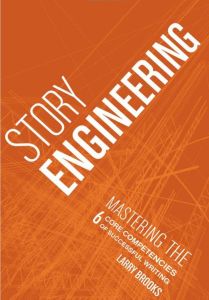 Yes, this book has a strong anti-pantser (writing by the seat of our pants) bias, and I’ve pointed out before that story failures are more often a symptom of not understanding story structure than with pantsing methodologies. Pantsing and plotting strategies can both fail or succeed, and in either case, those who understand story structure will be more likely to come out with a coherent story.
Yes, this book has a strong anti-pantser (writing by the seat of our pants) bias, and I’ve pointed out before that story failures are more often a symptom of not understanding story structure than with pantsing methodologies. Pantsing and plotting strategies can both fail or succeed, and in either case, those who understand story structure will be more likely to come out with a coherent story.
Pantsers able to ignore that naysaying, or those who plot in advance, will find a great discussion of story structure within these pages. Don’t miss my post or worksheet to help writers of any length stories use this structure.
Save The Cat! The Last Book on Screenwriting You’ll Ever Need
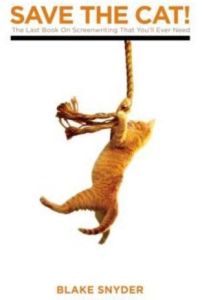 This book isn’t my favorite for learning story structure (and it’s geared toward screenwriters rather than novelists), but it is a classic that literally “wrote the book” on many story structure ideas and strategies (like the concept of beats and beat sheets).
This book isn’t my favorite for learning story structure (and it’s geared toward screenwriters rather than novelists), but it is a classic that literally “wrote the book” on many story structure ideas and strategies (like the concept of beats and beat sheets).
It reveals audience (or in our case, reader) reasons for why stories are structured the way they are, and that’s good for every writer to understand. Don’t miss my post about how writers of any length stories can use this structure.
Hooked: Write Fiction That Grabs Readers at Page One & Never Lets Them Go
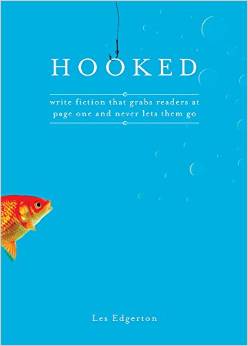 We’ve discussed the importance of story openings many times here before, from how to avoid first-page clichés to what makes readers close a book. Grabbing readers’ attention is an important skill because if our story has a bad beginning, no one will keep reading. Period. The end.
We’ve discussed the importance of story openings many times here before, from how to avoid first-page clichés to what makes readers close a book. Grabbing readers’ attention is an important skill because if our story has a bad beginning, no one will keep reading. Period. The end.
Whether we traditionally publish or self-publish, a great beginning is a necessity. This book covers the elements inherent to any great beginning and can help us overcome weak openings.
That’s a start for a few books that I’ve read and appreciated, but I’m missing loads, I’m sure. I don’t have any grammar books up there. Or any publishing industry or self-publishing books. Etc., etc. So I suspect this page of recommendations will be a work in progress. *smile*
What are your favorite writing-related books? What makes them your favorites? What books have helped you the most in your writing journey? How have they helped? Is there an area that you still struggle with and want recommendations for books in that specialty?
Pin It
I’m pleased to say I have five of those 🙂 I’m feeling a little reluctant to buy any more right now, I’m overwhelmed with what I’ve got!
Hi Lara,
LOL! I understand. 🙂 I have several more writing books in my to-be-read pile, so I haven’t judged their quality enough to include them in my list yet. Thanks for stopping by!
Jami, you are too good to Becca and I! This plug in looks great…I will have to snag it to convert my suggest reading page, too. You and Jay find the best stuff, I swear.
Hi Angela,
Quality deserves every kudo it gets, my friend. I’m just telling the truth. LOL! Thanks for the comment!
Goal, Motivation & Conflict by Debra Dixon
This book has been invaluable to me. Amazon has copies at outrageous prices, but you can go to the website and get a hardback copy for $20 bucks.
http://www.gryphonbooksforwriters.com/?page=shop/flypage&wt=1.00&product_id=23&CLSN_1737=13269462991737ddf021dc4c07cbcf4d
Hi Pamela,
Great suggestion! That book is another classic that triggered better understanding of the pace of scenes and stories. 🙂 Thanks for sharing!
Jami, here are a few of my favorites:
– Writing Alone And With Others, by Pat Schneider
– Novel Ideas, by Shoup and Denman
– The Plot Thickens, by Noah Lukeman
– Page After Page, by Heather Sellers
– Chapter After Chapter, by Heather Sellers
– Writiing The Wave, by Elizabeth Ayres
Hi SJ,
I’m not familiar with those books. Yay! More to check out. 😀 Thanks for sharing!
I just finished Shoot Your Novel: Cinematic Techniques to Supercharge Your Writing by C. S. Lakin.
Loved this book!
Hi Laurie,
Great! I’ve read C.S. Lakin’s blog before, so I’ll have to check out that book. Thanks for sharing! 🙂
I love MyBookTable. After a hundred iterations through my website, that’s the one plugin I will swear by. I use it to showcase my own fiction, but I really like what you’re doing: it’s a wonderful way to recommend your favorites!
Also: The Emotion Thesaurus. I’ve been thinking about it for a while, and after an author friend sang its praises, I finally relented and ordered my own print copy. It’ll be here my Tuesday! I hope it’ll be as cool and useful as everyone says 🙂
Thanks for sharing!
Hi Ron,
I hope the ET is helpful for you too! Good luck with it. 🙂
And I’m working on getting my own fiction into the system. LOL! Thanks for stopping by!
I share several of the same favorites. Also on my list are:
Wired for Story by Lisa Cron. One I recommend often! Great insight on what keeps a reader reading.
My Story Trumps Your Story. Written by a screenwriter, but this one made so much sense to me about character arcs and plot points. I’m currently using some of the perspectives on my WIP and feel like it’s flowing better in the first draft.
2k to 10k: Writing Faster, Writing Better, and Writing More of What You Love by Rachel Aaron. By no means do I write 10k words a day, but I appreciated the tips Aaron gave and use several to make sure my writing is on track.
Thanks for the list, Jami! I will definitely be checking out the POV book you mentioned.
Hi Julie,
I’ve skimmed Wired for Story but haven’t read it deeply enough to recommend it through and through yet, and I think I have 2k to 10k in my TBR pile. LOL! I need to get on that. 🙂
I’ll have to check out your other suggestion too. We probably all can point to how we can hear an idea several times, but it doesn’t fully click until we hear it a certain way that really resonates with us. 🙂 Thanks for sharing!
Debra Dixon’s Goal, Motivation, and Conflict (Now available on Kindle after being almost impossible to find in print) and Larry Brooks’ Story Engineering.
Hi Kait,
Good to know that GMC is on Kindle now! Thanks for letting us know! 🙂
Thanks for the mention Jami! I’m happy the plugin is working well for you! 🙂
-Jay
@jaytechdad
Thank You for the great service, Jay–as always! 😀
Thanks for the list, Jami. I can second your recommendation of Self-Editing for Fiction Writers. Another good one for revising is Manuscript Makeover by Elizabeth Lyon, who also wrote A Writers Guide to Fiction, which is really good. Other favorites: Donald Maass’ Writing the Breakout Novel, and Morrell’s Between the Lines: Master the Subtle Elements of Fiction Writing.
Hi Deborah,
Thanks for the suggestions! I’ve read DM’s Writing the Breakout Novel (and since forgotten that I had because I got it from a library and it’s not forever staring at me from my shelves–LOL!). I’ll need to check out those other books. Thanks for sharing!
Note to self: I can see that this was a dangerous blog post to write, as I’m rapidly increasing the size of my TBR pile. 😀
This is a good list and I also like some of those listed by fellow commenters. My first best book on writing is an impossible to find Air Force manual called Tongue and Quill written in 1977. Even though I went to a good high school, this is where I first learned about the errors of passive voice, run-on sentences, and stilted, overly “academic” writing styles. It taught me to write to my audience in an appropriate conversational style.
But, Jami, when are we going to see your book on writing?
Hi Robert,
As someone else whose writing instruction was…um, not the best, I’d love to see more suggestions for basic grammar. 🙂 I read several from the library back when I was first starting. I’ll have to see if I can remember what those were. LOL!
And to answer your question, I’d love to put together a writing book! But until someone grants me a time-turner, my limited time is eaten up by other projects. 🙁 I’ll keep you posted!
The trick with grammar guides is organization. Indexes never list things like how to set off internal or telepathic dialog, US vs UK quotations markings, Oxford commas, or other rules without 20 minutes researching.
Can anyone suggest a good searchable grammar guide?
Hi Robert,
One grammar book that’s on my list because it’s specifically geared toward fiction writers (I haven’t gotten it yet, so I can’t vouch for it one way or another–but I’ve been impressed with her work before) is Marcy Kennedy’s Grammar for Fiction Writers. Kindle books are searchable, so I don’t know if that would help, but I figured I’d share what came to mind. 🙂
As for some of your questions, many of those don’t have “one right answer” and might depend on the style guide of your publisher. And if we self-publish, we can come up with our own style guide to make sure we’re consistent with whichever rule we decide. 🙂 Thanks for the comment!
I’ve found many writing books useful some of which are listed in the comments or your post, but my other favorites right now are:
Writing 21st Century Fiction – Donald Maass
The Fire in Fiction – Donald Maass
Writing with Emotion, Tension, & Conflict – Cheryl St.John
Structuring Your Novel – K.M. Weiland
I will admit that my writing book collection is getting out of hand. My husband has limited me to one shelf only, and I am slowly stuffing that shelf to the gills. 😉
Hi Addy,
LOL! I understand. (And this blog post isn’t helping. 😉 ) Thanks for sharing your suggestions!
All excellent books! I happened to have several, although I really like Self Editing for Fiction Writers. That is an invaluable tool. And for some reason, any craft book written by James Scott Bell resonates with me. I guess it’s how my brain is wired. lol. Let’s not go there, okay? And I find your post on craft very helpful too! Thank you Jami! 🙂
Hi Karen,
I have a couple of James Scott Bell’s books in my TBR pile, so those are on my list to check out. 🙂
As you said, sometimes how a person explains something can resonate with us. When that happens, a lesson can click far better than the 10 other times we’ve studied it. 🙂 Thanks for sharing!
I’m currently reading hooked and let’s just say that I am! haha. I’ve heard of the emotional thesaurus but haven’t got a copy yet. Might need to add the rest of these to my goodreads list.
Thanks for sharing!
Hi E.G.,
LOL! I hope the books are helpful for you. 🙂 Thanks for stopping by!
HA! I had JUST gotten off of Amazon where I was ordering craft books, two of which were on your list!
You are starting to freak me out, Jami! lol
Hi Renee,
LOL! Um, sorry? 🙂 Thanks for stopping by!
The book that probably influenced me most in thinking about story is Al Zuckerman’s “Writing the Blockbuster Novel”, which has a lot of advice that’s simultaneously practical and adaptable – even though it’s all about “mainstream blockbusters” and I write fantasy fiction.
On the fantasy front, Jeff Vandermeer’s “Wonderbook” was a fantastic reminder to indulge your creativity.
Hi Dee,
Very cool! Thanks for sharing why you liked the books too. While I’m all for sharing titles we like, the reasons why are often more helpful. 🙂 Thanks for the comment!
I’ve read a few of these. My absolute go-to book when prepping for a new book is Plot & Structure by James Scott Bell. And once I’m on draft 2 or 3, the Emotion Thesaurus is a must.
Hi Julie,
I definitely need to pull the James Scott Bell stuff out of the to-read list. 😀 Thanks for sharing!
Gah! I’ll be honest. I never get tired of seeing our books in such good company :). Thanks for the shout out, Jami. And I really need to check out Hooked.
Hi Becca,
LOL! *hugs* I wouldn’t say it if I didn’t mean it. 🙂 Thanks for stopping by!
Oops! Forgot to mention that one of my favorites is Structuring Your Story, by KM Weiland. I’d also like to second Self-Editing for Fiction Writers and Save the Cat :).
Ooo, you’re not the first to mention KM’s book. Thanks for the suggestion, Becca!
I’m a huge fan of Holly Lisle’s writing aids (full disclosure: affiliate link). I’m particularly fond of her “Create a […] Clinic” guides. The Create a Language Clinic enabled me to quickly produce the rules for several conlangs for my epic fantasy series, with notes about tweaks dependent on dialect.
I bought the first edition of the 4-book set, years ago, and then bought them again when she updated and revised them. She more recently released a new one in the series—Create a World Clinic—which is on my to-buy list.
Hi Carradee,
Good suggestions! I have many of Holly Lisle’s “Create a…” books too. Thanks for reminding me of that–I sense my initial list was driven by book I have in paper form right here in front of me, while my ebooks languish, mixed in with the rabble. LOL! Thanks for sharing!
Good reference books; I own three or four of them. I’d have to check my book shelf.
Hi Dolorah,
Yep, this was a list off my bookshelf, but I’m sure I’d find more if I went through my Kindle. 🙂 Thanks for stopping by!
Some great books there 🙂 I’ve also enjoyed
Stephen King’s On Writing;
Rayne Hall’s Word-Loss Diet for Writers
James Scott Bell Write Your Novel from the Middle
Jill Elizabeth Nelson Rivet Your Readers with Deep Point of View
Hi Jeanette,
Ooo, there are a couple of titles I need to check out there (and at least one in my TBR pile 🙂 ). Thanks for sharing!
Jami,
A crowd-sourced list of the best writing craft books. What a great way to showcase the plug-in. And what a great plug-in.
I think we should add Strunk & White, The Elements of Style, just because, you know . . . Strunk & White.
Also, here’s a time-turner. *hands over small golden box with dials and knobs* So now you can write a craft book for us.
Kathryn
The Elements of Style by Strunk & White is not a good reference. Beg pardon for yelling, but it was designed as a house style guide for a specific university, to apply to nonfiction, and has outright errors in it.
Hi Carradee,
Thanks for sharing the insights of a copy editor! 🙂
As you rightly point out, the rules for fiction are different from non-fiction. So as with all advice, every book listed on this page (both mine and in the comments) should come with a disclaimer to pay attention to the source and adapt to our own situation. 🙂 Thanks for clarifying that point!
Hi Kathryn,
*looks around for the instructions for working the device* Darn it! 😉
Thanks for sharing!
Those all sound like some handy books! Right now, I’m going through Self-Editing for Fiction Writers with my manuscrip, and it’s quite helpful!
Here are some other favorites of mine:
The Nighttime Novelst by Joseph Bates
Your First Novel by Ann Rittenberg
Worlds of Wonder by David Gerrold
Hi Jennifer,
Thanks for sharing your suggestions! We all learn differently, so it’s good to have a variety of books to try. 🙂 Thanks for the comment!
I’d like to add Super Structure: The Key to Unleashing the Power of Story, by James Scott Bell. I found his take on structure to be very useful – a 14-point analysis that includes such fun signposts as “Pet the Dog,” “The Q Factor,” “Lights Out,” and at midpoint, “The Mirror Moment.”
Hi William,
Good addition! I love James Scott Bell’s description of the Midpoint–that Mirror Moment–the best of anyone’s. 🙂 Thanks for sharing!